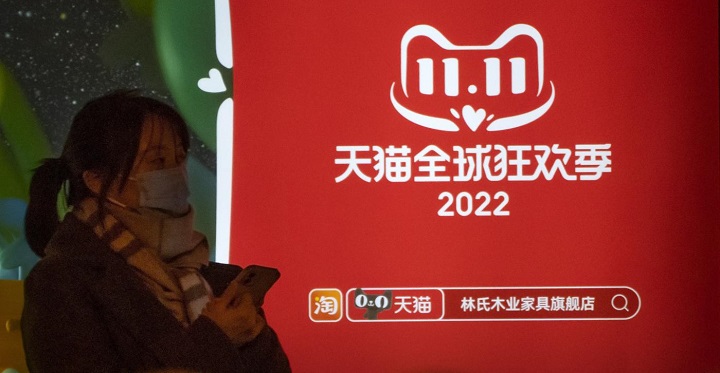
China’s communist party’s recent reorganization and consolidation, announced at the Party Congress last month, is no small feat. It is at least partly in line with a global trend of reorganization of the state. But it doesn’t address three converging trends building tension about China.
The party as accessory to the army
The controversy over the extension of Mr Xi Jinping to an “unprecedented” third term as party chief offers an occasion to look at the structure of Chinese power and then have a glimpse at its future.
The key to power in China has always been the army, and from that the party (the CCP) took form, not the other way around like with the Bolsheviks. In 1917, Lenin took power as the party successfully infiltrated the Russian state and army and staged what was de facto a coup. But after that, when confronted with the white army, the Soviets had to build their own red army almost from scratch.
Zhou Enlai, in contrast, started his revolutionary career as political commissar of the KMT military academy at Whampoa, where Chiang Kai-shek was military chief. The party as a military tool was reinforced when the 1927 Shanghai uprising failed and the party had to win power through a long field war against the KMT, culminating 22 years later, in 1949. It was fully in the Chinese tradition where a bandit rose to power thanks to his military/political exploits. Here military and politics are two sides of the same coin, one can’t live without the other.
This is why all of China’s paramount leaders were first and foremost army chiefs. At times, as with Mao and Deng, they gave up on leading the party, but never renounced guiding the army, the PLA. The army then is first an instrument of internal cohesion. For this reason, the military regions, whose borders were often changed in PRC’s history, never coincided with provincial borders, and straddled different provinces.
All the times when political leaders (say Liu Shaoqi, president of the state in the 1960s, or Zhao Ziyang, party secretary in 1989) tried to wrest political control from the military leaders (Mao and Deng, both chairmen of the military commission, the army’s top decision-making body) they failed. It was because the party is a tool of the army and not the other way around. Here the police and intelligence are a second leg to the army capabilities.
The army leadership even transcends the official title, it is something very personal. Famously the army, although skeptical of Mao’s excesses, never revolted against him and failed even to back his “dauphin” Marshall Lin Biao when he turned against him in 1971.
With Deng it was similar. In the post Mao succession, Deng was chosen as top leader despite Chen Yun having been more senior in the 1950s and 1960s. One reason was probably that Deng had stronger army experience and support.
Moreover, even after 1989, when Deng gave up his title of military chair of the PLA central commission, he still called the political shots until 1995, when he had an almost fatal stroke. In that moment Deng’s chief of staff, Wang Ruilin, handed Jiang Zemin, the official party and army chief, all of Deng’s archives and office materials. Then for the next couple of years, until the old man’s actual death, Jiang began to assert his authority although he was battling news that Deng had recovered and that his authority superseded Jiang’s.
In sum, from 1949 to roughly 1995-1997, China’s two paramount leaders held the reins of power thanks to the army. Politics was controlled in different ways, not always very effectively. Mao had to struggle constantly with many comrades and so did Deng.
The present situation
This is the long-term baggage that Xi Jinping is coping with now. In the medium term, after Deng’s demise, the legacy is also very complicated.
The only general secretary who served only two terms was Hu Jintao. Jiang Zemin was appointed party and army chief in 1989. He then served a half term, until 1992. Therefore, he was in for two full terms, until 2002, as party and army chief. Then he had two more years as army chief and the number-one official until 2004, and he retained massive influence until 2012.
Of course, from 1989 until 1995 (when Deng Xiaoping had his stroke) Jiang wasn’t in control, and in the four years after that he was actually struggling.
In 1997, Jiang managed to introduce age limits really just to get rid of Qiao Shi, who was the real major force possibly until the 1999 FLG (Falun Gong) protest (when the FLG surrounded China’s Kremlin, Zhongnanhai). The protests were blamed on Qiao and for this he was cast aside.
But as Qiao Shi was ousted from the decision-making process in 1999 because of the FLG protests, so was Jiang in 2012 because of the Bo Xilai (Chongqing’s party chief involved in the strange murder of English fixer Neil Heywood) and Lin Jinhua (Hu’s chief of staff whose son was killed in a mysterious car accident) affairs. Both had Jiang’s fingerprints on them, and he was excluded from the decision-making process.
Therefore, what is really unprecedented is Xi Jinping’s way of staying in power. He is building a new structure of power reinforcing the party structures—“party building” in 20th Congress parlance—that ideally should avoid all the political ups and downs of the past seven decades.
It is a gargantuan Leviathan with no precedent in size and organization, hinging on a 98 million party force (1 in 14 Chinese, including children) and fired by a pervasive web of technologies that leave no room for potential privacy. Actually, here any possible privacy becomes suspicious.
The system is paranoid but in this it may be somehow loyal to the spirit of the modern state, which was built in the 17th and 18th centuries in Europe based on the inspiration from the contemporary Chinese state, as it was known through Jesuit translations. The Chinese state was particularly structured and paranoid for the European standards of the time.
It would be superficial for foreigners to underestimate the efficacy and responsiveness of this structure. It is nimbler than it may look, and it has a honed practice of responding to internal pressures and stimuli. Most importantly it fits Chinese people’s cultural tradition, and Chinese people recognize it easily. Technology and modern organization only extended to unprecedented depth and efficiency what Chinese tradition envisioned since the Zhouli (Rituals of Zhou, 5th century BC). Its power was fully manifested with the Covid epidemic, succeeding in what no other state could—closing off the country to the virus.
The economy
But as Chinese philosophy tells us, where there’s yin, there is also yang. The huge growing domestic efficiency of the party has a hard time dealing with the economy and foreign affairs.
The new party structure, with its anti-corruption system, has killed the old corrupt way of doing business, but there is no new way, no clear market drive. This environment made doubly efficient the “zero Covid” policy that has practically neutered domestic consumption. Plus, we have the collapse of the real estate market, and presently domestic growth is basically driven only by infrastructure projects that build up an ever-expanding domestic debt, distributed between state-owned companies (SOEs), local authorities, and the central government. The total debt might be around a staggering US $50 trillions. Total global GDP is about US $80 trillions.
China’s actual only real pillar of growth is exports, which should reach about 1 trillion dollars of surplus by the end of the year. China’s total surplus is shouldered by G7 countries’ total deficit with China. It comes basically from the G7, which are growing more hostile to China. The surplus, with the reserves it generates, feeds the domestic market but it is a problem for everybody else, as at the times of the Opium Wars, and the G7 can hardly sustain this kind of deficit.
Here there are some signs of trouble. China’s exports in October dropped 0.3% from a year earlier, while imports shrank 0.7%, both missing expectations.
Are China’s exports starting to decline? If so, what driver will prop up the economy? Is Beijing facing a major U-turn or will it move straight ahead?
On November 6, Han Wenxiu, deputy director at the General Office of the Central Economic and Financial Affairs Commission and expected to be promoted in March, reportedly said that “China needs to regard development as the No. 1 priority and ensure a ‘reasonable growth’ of the national economy in a persistent way, a senior economic official said, outlining goals for the next five years.”[1]
Still this argument can be worrisome. Arguing that economic growth is “still the No. 1 priority,” means the concept was not sure, and the government recognized the economy is playing a distant second fiddle to concerns about security.
Now underscoring the necessity for growth and thus signaling to foreign markets growingly worried about China’s prospects, hardly squares with the Party Congress’ emphasis on security. If needs for growth clash with security or politics, what trumps what? If the answer is not unequivocal for growth, many will worry. If growth will trump security, political concerns must be revised.
Abroad
China is stuck in a difficult domestic situation and in a very difficult international situation where all its “friends” (Russia, Iran, North Korea, and Burma) give it more troubles than its enemies.
In the meantime, recent events in Europe and Ukraine prove that American decline, the keystone of Chinese foreign analysis, was largely exaggerated.
In the 1960s and 1970s America was bitterly divided over political issues that fed the propaganda and agenda of its Soviet enemy. The country was almost on the brink of a Civil War. Yet the US held out and eventually won the Cold War.
Here it is different. America is divided in itself. It is not like 50 years ago when the USSR thrived on American divisions. Here the adversary, China, doesn’t divide America; it holds it together. Hostility to China is the one bipartisan element that unites America. Paradoxically without the “China story” the US could break apart.
Paradoxically, to “beat the US,” China should stop being “China,” the enemy, the threat, the dictatorship, the unfair trader, the trampler of human rights, and the technology thief.
Even that wouldn’t be easy because China has groomed a network of enemies that would last beyond the US. Japan, India, Vietnam, and Australia are more than enough to fight China.
Also Europe, for decades the ideal counterbalance to American power, with the Ukrainian war looks more united and more pro-America. Then greater unity in the old continent, especially with the ex-Soviet satellites, could be more useful in the anti-China effort, rather than a more disunited Europe ready for cherry picking by any anti-Americans on duty.
President Donald Trump in his first administration aimed to tame Germany and make a pact with China. Today the situation is much changed. A pact with China is much more difficult.
So, to summarize the situation:
- China’s neighbors not only chafe at Beijing’s arrogance but now believe they can have dividends in investment by moving out of China and reallocating to their countries. So they have an active interest in building up tension.
- The USA is divided on everything but united against China; thus, it’s very hard for any American leader, democrat or republican, to make real concessions to Beijing.
- Foreigners want RMB full convertibility and free access to China’s domestic market. Still, to realize it, China should become politically more open (with a financial crisis in a democracy, the Premier will resign, and a new election will have a new Premier; in an authoritarian country, the system will implode). Plus, it should have clarity on its domestic debts, possibly hovering at $50 trillion. This murky number, where nobody knows what is owed to whom, is the largest pitfall of the global economy.
In a few words, short of a massive change of heart in China, a slide towards a clash, a war, in whatever form, seems unavoidable.
The question in Beijing should be: what can be done to avoid it, and what is China willing to pay to prevent it? War is a catastrophe, and even if it won a military conflict, it would destroy the international environment that made China rich.
It is a horrible situation resulting from over 20 years of neglect and errors, not over a few months. But the time to make up for all of that is now.
China can hope for a miracle, luck, and a sudden blessing from Heaven. But short of that, the rational scenario is different.
[1] See https://www.scmp.com/economy/china-economy/article/3198611/chinas-no-1-priority-still-gdp-growth-senior-economic-official-asserts-amid-focus-common-prosperity?utm_source=Twitter&utm_medium=share_widget&utm_campaign=3198611





